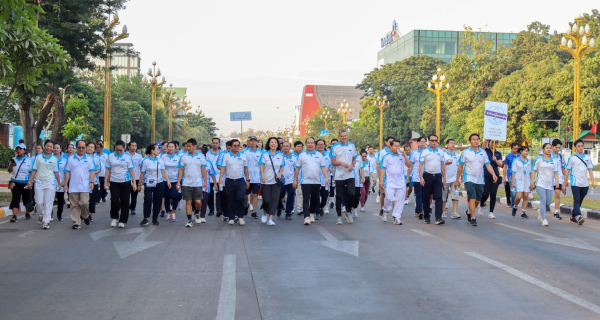KPL
Over 500 participants gathered at the Patuxay Monument in Vientiane on November 14 to take part in a public walk aimed at raising awareness about antimicrobial resistance (AMR), a pressing global health crisis. Organized by the Ministry of Health in collaboration with the World Health Organization (WHO) and the Food and Agriculture Organization (FAO), the event underscored the urgent need for a coordinated response to address AMR.

(KPL) Over 500 participants gathered at the Patuxay Monument in Vientiane on November 14 to take part in a public walk aimed at raising awareness about antimicrobial resistance (AMR), a pressing global health crisis. Organized by the Ministry of Health in collaboration with the World Health Organization (WHO) and the Food and Agriculture Organization (FAO), the event underscored the urgent need for a coordinated response to address AMR.
The walk, led by Vice Minister of Health Dr. Phaivanh Keopaseuth, brought together representatives from key ministries, development partners, and stakeholders. Participants reaffirmed their commitment to tackling AMR, a phenomenon that poses a grave threat to modern medicine and global health systems.
The Global AMR Challenge
AMR occurs when bacteria, viruses, fungi, and parasites evolve to resist the drugs designed to treat them, making infections increasingly difficult—or even impossible—to cure. Globally, AMR is estimated to cause 700,000 deaths annually, with projections suggesting this figure could rise to 10 million per year by 2050 if no action is taken.
"AMR is one of the top global public health threats, and the Lao PDR is no exception," said Dr. Phaivanh Keopaseuth. "It undermines decades of progress in medicine, making infections harder to treat and other medical procedures riskier."

Dr. Timothy Armstrong, WHO Representative to Lao PDR, emphasized the urgency of action: "We cannot allow this life-saving tool to be lost. Addressing AMR must be a priority for all sectors of society."
Economic and Agricultural Impacts
Beyond its impact on health, AMR has far-reaching economic implications. The World Bank estimates that AMR could lead to healthcare costs exceeding $1 trillion and global GDP losses of up to $3.4 trillion annually by 2030.
Ms. Kim Kyung-Mee, FAO Representative to the Lao PDR, highlighted the challenge AMR poses to agriculture and animal health.
"AMR management requires a multi-sectoral approach, including improved hygiene, vaccination, and monitoring antimicrobial use in plant and animal health," she stated.
The Lao PDR’s Commitment
The event coincided with World AMR Awareness Week and showcased the Lao PDR’s continued efforts to combat AMR. Key initiatives include: The National AMR Strategic Plan (2019–2023) and the establishment of the National AMR Committee.
Regular AMR surveillance and antimicrobial consumption monitoring, with data submitted to WHO’s Global Antimicrobial Resistance and Use Surveillance System (GLASS).
Partnerships with healthcare facilities to improve antimicrobial product management.
This dedication builds on the Lao PDR’s commitment, reaffirmed at the 79th United Nations General Assembly, to mitigate the impact of AMR on health, agriculture, and the economy.
The Road Ahead
Addressing AMR requires urgent, coordinated action across sectors and borders. The participants in Vientiane demonstrated that combating this global threat demands awareness, innovation, and collective efforts to ensure the continued effectiveness of antimicrobials for future generations.
KPL